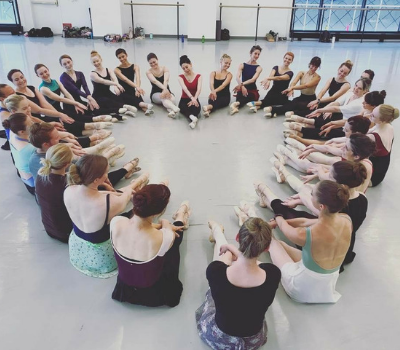From time to time, NDEO features guest blog posts, written by our members about their experiences in the field of dance education. We continue this series with an entry from Rebecca Santone, a student at Bridgewater State University. Guest posts reflect the experiences, opinions, and viewpoints of the author and are printed here with their permission. NDEO does not endorse any business, product, or service mentioned in guest blog posts. If you are interested in learning more about the guest blogger program or submitting an article for consideration, please email Shannon Dooling-Cain at sdooling@ndeo.org.
Join NDEO in July 2019 and Save 10% off Cost of Membership -- www.ndeo.org/membertypes - Use Discount Code JULY2019
Must register and pay by 7/31/19. Code is not retroactive to previous new member sign-ups or renewals.
Teaching is a Vocation, Not a Fallback
By Rebecca Santone, Student at Bridgewater State University

Like any other subject, dancing and teaching dance are two separate things. For example, you wouldn't expect an astronaut to one day leave their career and pick up a textbook in a local elementary school to teach first grade science. Teaching involves special knowledge and skills, such as classroom management, that are necessary for success in the studio.
Bridgewater State University, where I am a student, is known for its education programs. I am a double major in dance and secondary education, meaning that I am learning how to dance while learning how to teach dance. Within my dance major, there are many classes that are geared towards teaching dance, as many students that attend BSU plan to become dance educators one day. There is a difference between taking a ballet class, where I focus on perfecting my own technique, and taking a course where I learn how to teach others what I have learned in that ballet class.
Of course, it is possible to have careers in both dance performance and dance education. Some professional dancers teach while performing, while others wait to teach until they are retired. Look at Ballet West's Allison DeBona, for example. I had the opportunity to take classes with Allison through her summer intensive artÉmotion. During my time at the intensive, it was clear to me that Allison has a passion for teaching. She was student-centered in her methodology, gave effective and clear corrections, and was focused on helping us improve and have fun. Allison is currently a First Soloist with Ballet West, and I believe she is the perfect example of a professional dancer who has sought out teaching dance as a vocation, not as a fallback plan.
Other dancers, however, deflect to teaching dance solely as a way to pay the bills or as a fallback plan after their professional aspirations fall short. Others are forced to retire from dancing professionally, whether it be because of age, injury, or settling down with a family, and feel that teaching dance is the next step in their life. Teaching dance is not something that dancers should simply default to. As the professional dance world would not exist without dance teachers, dance education and dance performance are equally important career paths. The philosophy "those who can't do, teach" does the dance education world an injustice.
One problem with dancers "deflecting" to teaching is a potential lack of training specific to dance education. For example, if a dancer has only studied dance performance and has no training in teaching, they may lack skills such as teaching to all learning styles, classroom management, lesson planning, advocating for dance education, injury prevention, and other elements of dance pedagogy. Like other subjects, dance is not usually something you can simply teach effectively without some kind of teacher preparation. Without this crucial training, even the dancer with the best of intentions may be unprepared. This does not mean, however, that all dancers should give up their dreams of teaching. There are many teacher preparation programs available through colleges and universities, as well resources for professional development such as those provided by the National Dance Education Organization. It is important to keep in mind that dance education is a separate vocation from dancing professionally, one that requires its own knowledge, skills, and experience.
As important as training and skills for a dance education is one’s attitude towards teaching. If a professional dancer, like Allison, truly has a passion for dance education, then that dancer has great potential to be an effective dance educator. However, if a dancer is only pursuing teaching because they feel they have no other options, they may have a negative attitude towards teaching. Take, for example, the fictional character of Saskia on Dance Academy. Saskia was a star of her ballet company, but is given the chance to teach when her career is put on hold due to an injury. Her character was cruel to her students and became jealous when they could do things that she was physically incapable of. Anyone who pursues teaching needs to have the attitude that dance education is an important and valuable career choice, not only a “second act” or something to look down upon. If someone thinks of teaching only as a fallback career, perhaps they should not be teaching dance.
As members of NDEO, we know how important dance education is. Research as well as anecdotal information shows that dance education can improve the lives of students of all ages, ethnicities, and genders. It is important for us to remember that just because someone is a good dancer does not mean they will be a good dance teacher. At the same time, just because someone is not cut out for a career in professional dance (like me!), does not mean they will be a bad dance teacher. To quote Damn Yankees, all you really need is heart, and the heart of a good dance educator believes in teacher training and putting the needs of students first. Dance education is not something to casually fall back on, but a worthy career that takes time, effort, and education to properly pursue.

Originally from Massachusetts, Rebecca Santone is currently a dance and secondary education major with a minor in musical theatre performance at Bridgewater State University in Bridgewater, MA. She has been dancing since she was three years old and has served as a choreographer for both the BSU Dance Department as well as local theatre companies. She is also on the executive board of BSU’s National Dance Education Organization student chapter. She also frequently writes articles on her dance blog, Ballet with Becca.